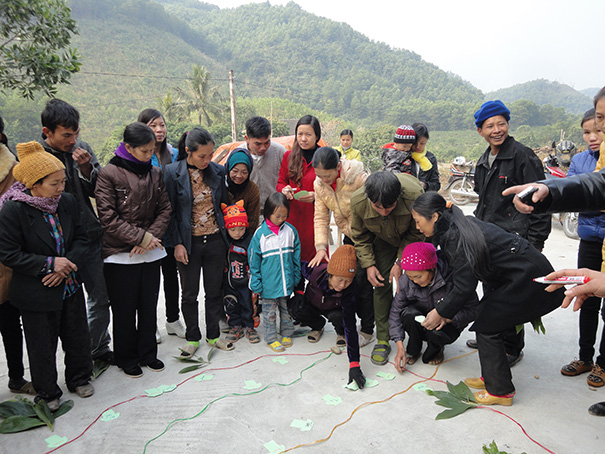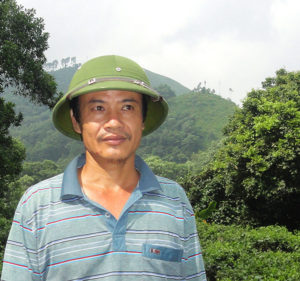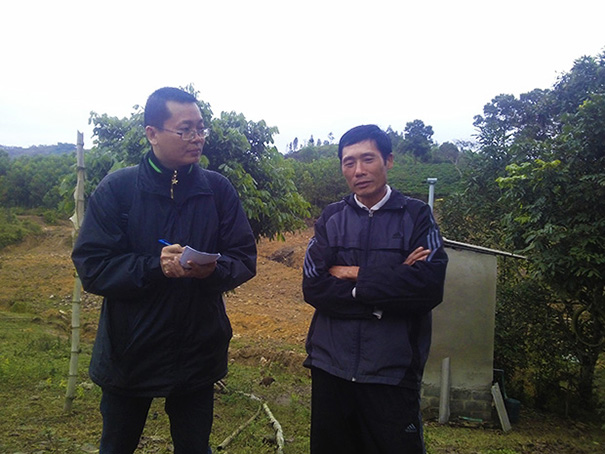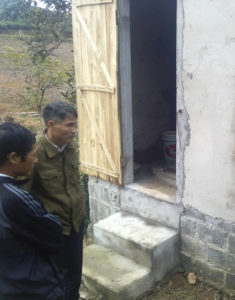I had a chance, after quite some time, to return to Khe Cua 2 village in Thai Nguyen province in northern Vietnam. CWS partnered with communities in the area to address health and environmental sanitation concerns. Walking down clean village roads, I noticed immediately that the village has changed since my previous visit. There is a fresh and clean environment everywhere – from the open roads to household compounds. Importantly, I see that 100 percent of homes have their own latrines, which are well maintained and, I am told, properly used.
The Khe Cua 2 village is spread over about 285 acres of hilly terrain dotted by 43 household compounds where 166 people live and adults earn a living primarily by farming rice and planting tea.
Because Khe Cua 2 is sparsely populated with plenty of open space – and also because most adults have had little formal education and limited access to information about human health – almost everyone had the bad habit of not using a latrine: only a few families had latrines, and the rest defecated outside, either in the bushes or streams.
Without information or knowledge about the dangers of this habit, people in Khe Cua 2 did not consider open defecation to be a cause of health problems. But, when given the chance to know and understand the dangers of this common practice, the people in Khe Cua 2 were eager to change.
To share proof and show his pride for the change, the head of the village, Mr. Duong, took me to visit some families, and all of them were happy to share about their efforts to change from open defecation practices to new healthier behavior by using sanitary latrines. One of the most impressive changes was that of Mr. Nguyen Khac Ngoc’s family, who live in a remote part of village.
Mr. Ngoc, 52, has been a widower for 19 years and, as a single father, he has raised three children and made their education his highest priority. Though they work very hard in their rice paddy and on the tea terraces in their village, this family is poor. They have never had an ample food supply or many household amenities – often because his children’s school fees were most important to Mr. Ngoc. For this reason he also did not prioritize having a household latrine. Instead, like almost all others in the area, the family used a nearby field as their toilet without knowing the consequences it had for public and individual health.
To emphasize their new knowledge about the importance of sanitary latrines, and while still talking with Mr. Ngoc, Mr. Duong – the village head – said, “At first, it seemed that it would be very hard to change people’s habits and ask them to build latrines. But then, it was easier thanks to the CWS team who helped us learn about how we could change the situation for ourselves.”
But, with CWS help with through a Community-led Total Sanitation* effort, start-up activities helped people see the hidden dangers of open defecation. The activities – which involved children and adults alike – really shocked, and even scared, people into seeing the impact of open defecation.
Mr. Duong highlighted this when he said, “That shocking activity motivated us to decide to build sanitary latrines. Since latrines have been built, the number of people, especially children, who get sick is less than in the past.”
Mr. Ngoc also recalled this community event in a morning when almost all family representatives gathered together in the yard in front of the community house. Ngoc said: “My mind was opened after joining the gathering, and when I realized the huge amount of human waste that we create each year and then how this waste returns [to our village environment] when we do not dispose of it safely. I then understood the reasons that many people here, particular children, get sick from our poor sanitation habits.”
After his reminiscing, Ngoc took me to a corner in the back yard of his house and showed me the family’s latrine explaining, “I kept thinking over all the shocking information I received and then decided to build a sanitary latrine even though it costs more than 2 million Dong [about $96], which is rather much for our family. But, because I got help with the labor from neighbors and guidance from CWS team members, we have made it. For our family’s reputation and pride, we wanted to join the other families who have built latrines, too.”
Mr. Duong added, “So, all families are now using latrines and our village was honored as and provided with Open Defecation Free certificate.”
Saying goodbye to Mr. Ngoc’s family, we returned to the commune and I saw more latrines on the way back. Mr. Duong happily shared with me good news that once the village proudly received a delegation from another province, who came to learn about the CLTS model and experiences in motivating families to prioritize having latrines. I felt very happy as our small successes so far will now benefit many other communities in Vietnam.
Ngo Quoc Dung is CWS’s Vietnam Country Representative.
*Community Led Total Sanitation is a methodology for mobilizing communities to end open defecation starting with help in self-appraisal and analysis of their sanitation profile followed by action to become Open Defecation Free. CLTS is designed to be provocative and fun and to facilitate / support community decisions to build low-cost sanitary latrines.




